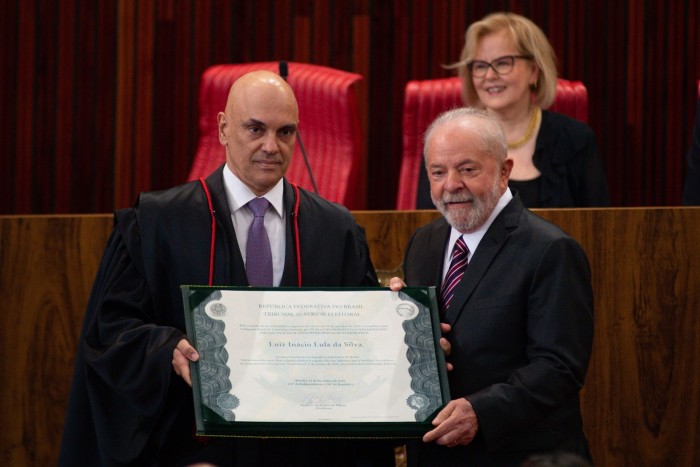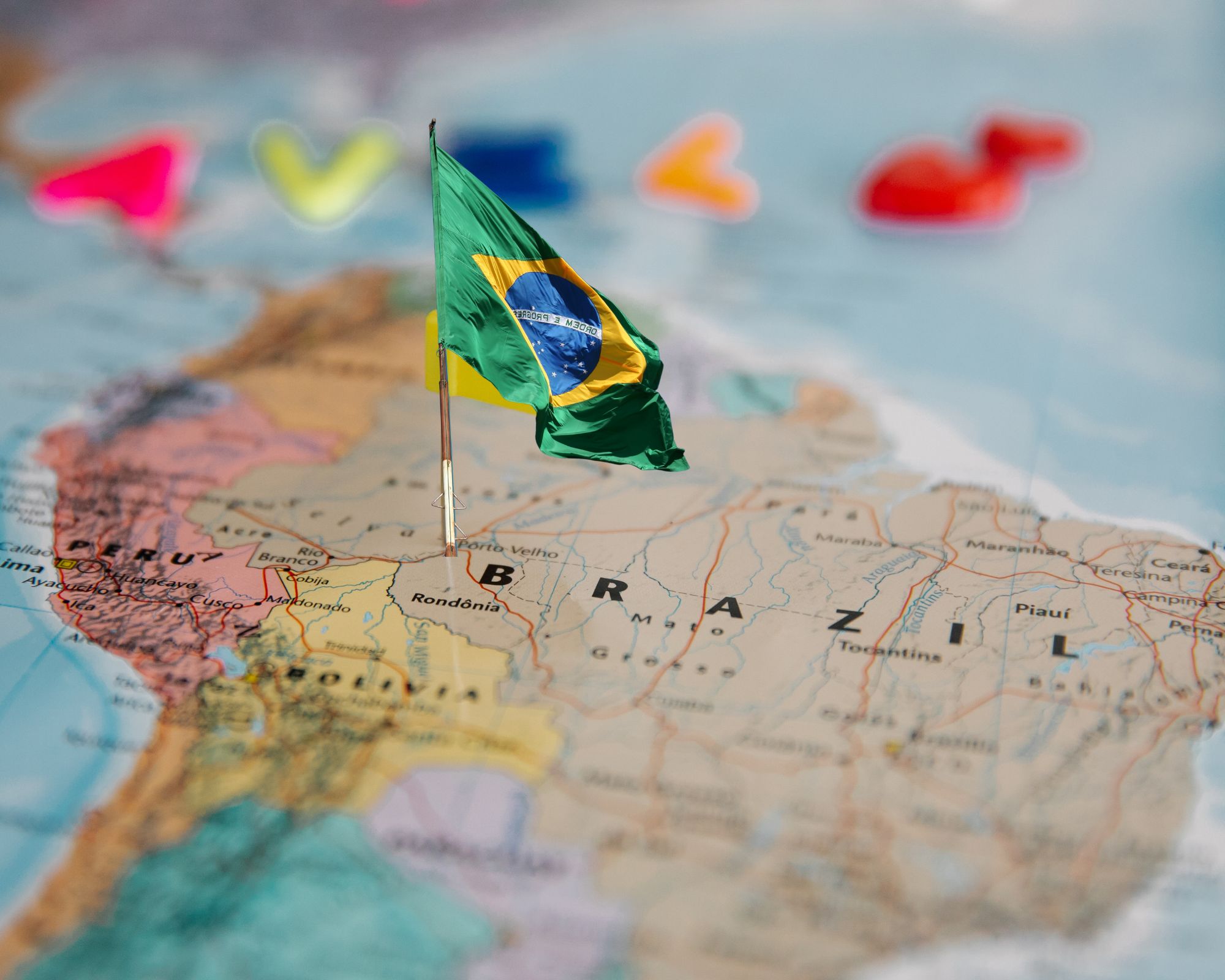Summary:
-
Torres was charged with neglect of duty.
-
Police and Bolsonaro supporters fought in Brasilia.
-
Bolsonaro’s claims of widespread election fraud in Brazil indicate that he has read the Trump memo.
-
Like Torres, Bolsonaro has been staying in a home in Florida owned by José Aldo, a former mixed martial arts fighter from Brazil.
-
“Lula has rebuked the armed forces in the wake of the riot, saying they are not the moderating force they think they are. “
Former federal police agent Torres, who served as the previous president Jair Bolsonaro’s justice minister, dismissed a number of the police commanders in Brasilia before departing for a vacation in Florida.
His getaway has been shortened. The Supreme Court issued an arrest warrant for Torres after the storming of important government buildings in Brasilia on Sunday, which was the largest assault on Brazilian democracy since the military dictatorship of the 1980s. Torres was charged with neglect of duty.
A draft presidential decree that appeared to command an intervention to alter the outcome of the October election—which the far-right Bolsonaro narrowly lost to Lula—was also discovered by federal authorities in Torres’s residence.
Torres has denied any role in the unrest, which had striking similarities to the assault on the US Capitol on January 6, 2021. He claimed in a tweet that the police had “leaked out of context” the draft directive. In his residence, he claimed, “There was a pile of paperwork for throwing away, where very likely the document described in the report was found.” Additionally, Bolsonaro has denied any involvement in the disturbance.
But according to government officials, Bolsonaro supporters’ three-hour rampage, which included looting Congress, the presidential mansion, and the Supreme Court while smashing windows, trashing furniture, and cutting artworks, amounted to an attempt at a takeover. They also think that some members of the security forces who were loyal to Bolsonaro turned a blind eye, which helped.

Ricardo Cappelli, temporarily in charge of security in Brasilia on behalf of the federal government, says that Anderson Torres took over as security secretary, fired everyone in order, and then left. If this isn’t sabotage, what else is it?
As he begins his third term in office, which he had anticipated would focus on eradicating poverty and protecting the environment, 77-year-old Lula finds himself in a hazardous minefield that includes looking into right-wing individuals like Torres. Instead, Lula will spend his time—at least initially—trying to save and support Brazil’s democratic institutions without igniting a fierce right-wing response.
Many of his fans want a full investigation of what caused the unrest and long prison sentences for those who are found to be responsible. They contend that there is no other way to safeguard democracy.
But because the country is so divided, Lula only won by a small margin in the second round run-off. Many of Bolsonaro’s supporters still strongly disagree with this result. Lula is aware of the political pressure and claims of conflicting loyalties that make the military, the Supreme Court, and other institutions squeak.
Lula hinted on Thursday that he might face opposition from the presidential palace. “How can I have a potential shooter at the entrance of my office?” Lula questioned the media.

This week, Atlas Intelligence released the results of a poll that showed how divided Brazil is. Nearly 40% of Brazilians said they didn’t think Lula won the presidential election, and 368.8% said they favor using military force to change the result. About 38% of Brazilians also said that storming the government buildings was wholly or partly right.
Since some Bolsonaro voters don’t like what happened, Filipe Campante, an associate professor at Johns Hopkins University, thinks Lula has a chance to try to keep the far right away, but he also warns of possible risks.
The temptation for right-leaning politicians to attempt to channel that energy for their purposes will be great, he claims. There is a lot of political power on the far right. Not to mention the fact that the far right has close ties to the military and law enforcement, which makes things even harder.
Copying and pasting from the Trump playbook
There is little dispute about the similarities between Brazil’s uprising and the one at the US Capitol almost exactly two years earlier, even though the cause of the Rio riot is still under investigation. This is not a coincidence because far-right activists in the two most populous countries in the Americas have frequently interacted and because Bolsonaro and Trump were close friends.
The Bolsonaro family and its allies, according to Robert Muggah, co-founder of the social policy group Igarapé, “are keen students of the Trump playbook.” Many of their strategies involve copying and pasting. Bolsonaro’s claims of widespread election fraud in Brazil are the clearest indication that he has read the Trump memo.
 During the riots in Brasilia, which had overtones of the January 6 attack on the US Capitol in 2021, Bolsonaro supporters were gathered outside the presidential palace.
During the riots in Brasilia, which had overtones of the January 6 attack on the US Capitol in 2021, Bolsonaro supporters were gathered outside the presidential palace. Pro-Donald Trump protesters during the US Capitol riots The former US president and Bolsonaro were strong allies. © Jose Luis Magana/AP
Pro-Donald Trump protesters during the US Capitol riots The former US president and Bolsonaro were strong allies. © Jose Luis Magana/APBolsonaro’s third son, Eduardo, a Brazilian congressman, was in Washington during the US Capitol riot. According to official visitor logs, Eduardo and his wife Heloisa visited the White House on January 4, 2021, two days before the insurrection.
Eduardo Bolsonaro “had a good opportunity to talk to people involved,” says Tom Shannon, a former top US State Department official. “The Bolsonaros came away from January 6 convinced that Trump had failed because he relied on the mob and didn’t have institutional support even from his own vice president.” Bolsonaro’s team then attempted to build institutional support in the Brazilian military and police.
Among the few significant political figures to voice full-throated support for the storming of Brazil’s landmark government buildings was Trump’s former chief strategist, Steve Bannon. “Brazilian Freedom Fighters,” Bannon wrote on the social media platform Gettr afterwards. “Lula stole the election; Brazilians know that.”
In another echo of Trumpian tactics and a questioning of the reliability of electronic voting machines, the rioters unfurled a banner on the roof of Congress during the brief occupation reading “We want the source code” in English and in Portuguese.
“I don’t accept an electoral system that I don’t understand, and I have no way of knowing if it recorded my votes correctly,” says Ana Maria Sousa, 40, a Bolsonaro supporter who was among those taking part on Sunday, having travelled more than 1,300 km from the southern state of Rio Grande do Sul.

Like Torres, Bolsonaro has been staying in a home in Florida owned by José Aldo, a former mixed martial arts fighter from Brazil. The former president has declared his intention to swiftly return to Brazil, where he is the subject of numerous investigations into his time in office, including allegations of corruption, mismanagement of the COVID pandemic that claimed nearly 700,000 lives, and an alleged conspiracy to spread false information.
Other conservatives who agree with Bolsonaro’s nationalism and social ideas but not his attacks on democratic institutions may try to take control of Brazil’s powerful political right, which made big gains in the congressional and gubernatorial elections last year.
However, Bolsonaro continues to enjoy ardent personal backing. Hundreds of supporters have been mixing all week outside his holiday house outside of Orlando, five minutes from Disney World. Many of them are sporting Brazil football jerseys.
Wanderlucio da Silva, 39, a Brazilian national who now lives in Connecticut, claims that “he is the first Brazilian president in my life where I know he is honest.” “For nearly 16 years, corruption, corruption, corruption has been rampant. He is a soldier. Additionally, the military has 90% honorable personnel. I adore him. We respect him.
Divided allegiances
Lula has spent the past week trying to show that everything is “business as usual,” but he is also worried about what important officials have done or not done.
The investigation into Torres is part of a more extensive inquiry into why critical government facilities were not adequately guarded on a day when Bolsonaro extremists had declared an “occupation” of Brasilia.
Some cops escorting the protesters were caught on camera taking pictures and purchasing coconut water rather than intervening as the demonstrators tried to storm the buildings.

The military is at the heart of these issues. Despite harsh criticism of newly appointed defense minister José Mcio for failing to do more to prevent the riot, Lula has stood by him—a decision analysts say reflects his mistrust of an institution deeply ingrained in Bolsonarista ideology.
Bolsonaro is a former army captain who filled the government with thousands of active and retired military officers and gave the military lots of praise and money.
In one indication of the mood among the military, Hamilton Mouro, a former army general who served as Bolsonaro’s vice president, initially condemned the “vandalism” of the protesters. But two days later, he attacked the arrest of hundreds of protesters by what he called a government with “Marxist-Leninist roots” that was “acting in an amateur, inhuman, and illegal way.”
Lula has rebuked the armed forces in the wake of the riot, saying they are not the moderating force they think they are. “The armed forces have a defined role under the constitution, which is the defense of the Brazilian people and the defense of our sovereignty against external conflicts.” “That’s what I want them to do,” he said.
Rafael Alcadipani, an expert on the armed forces at the Brazilian Forum on Public Security, believes Lula needs a more robust defense minister. “There is still a lot of Bolsonaro ideology within headquarters and the armed forces,” he says. “This needs to change.”
The other institution in the limelight is Brazil’s Supreme Sourt, which enjoys far broader powers than equivalents in different countries and has taken the lead in the official response to the riot.

It was one of its most controversial justices, Alexandre de Moraes, who gave the order to arrest Torres and suspend the governor of Brazil, Ibaneis Rocha—part of an 18-page judgment issued within hours of the riot.
During the election, Moraes led the fight against false information, which led some people to say he went too far. One worried person is Luis Felipe D’Avila, a political scientist and former right-wing presidential candidate. “There’s a degree of impulsiveness in the positions which Moraes has been adopting, which doesn’t sit well with the role of the Supreme Court,” he says.
This week, Moraes’ quick actions have made him a hero to many Brazilians, especially those on the left. However, they have made Bolsonaro’s supporters even angrier since they dislike him as much as they dislike Lula.
“The dictatorship we are fighting against has become even more open now. Alexandre de Moraes thinks he is the country’s emperor and can violate our rights and freedoms,” says Sousa, the pro-Bolsonaro protester. “But we are not going to accept that without a fight.”

